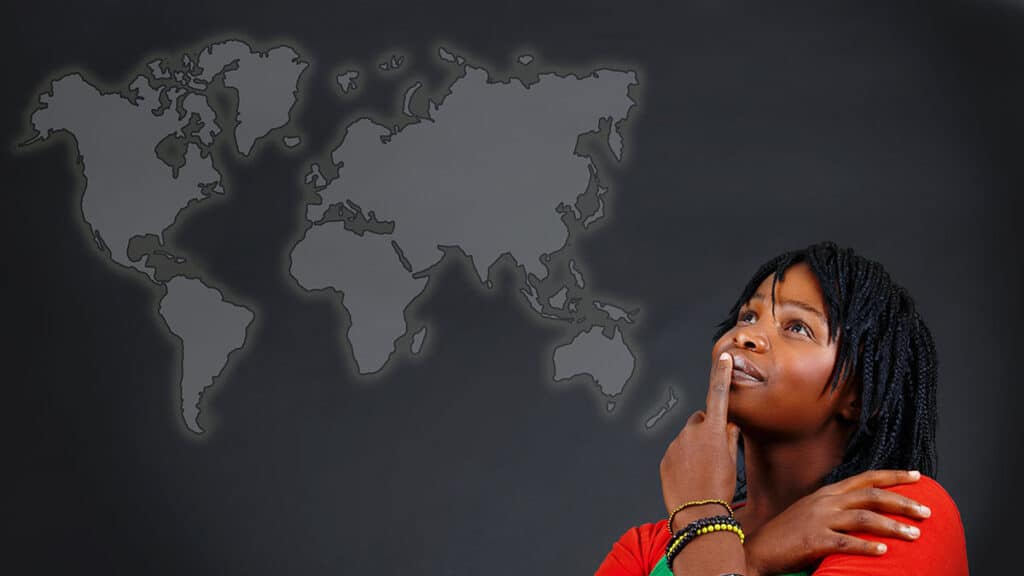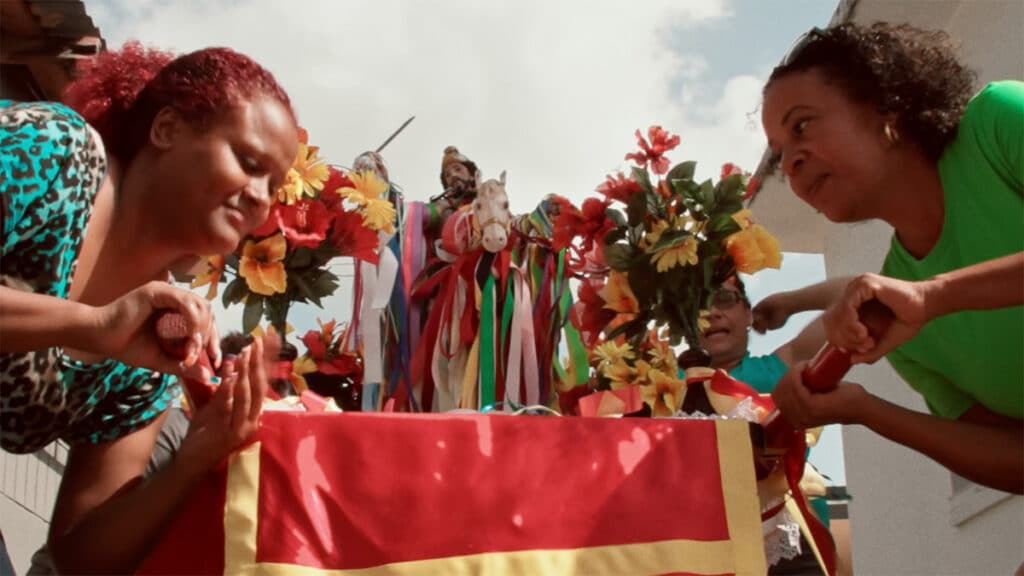
The African Diaspora International Film Festival NYC 2024 (ADIFF), is one of our favorite film festivals. It shows the triumphs and struggles of the African Diaspora around the world ~ including in many places you didn’t expect. The ADIFF tells many stories about the world’s largest diaspora ~ that just haven’t been told yet.
We Want to Watch Every Movie at
Keith Widyolar, New York Latin Culture Magazine
The African Diaspora International Film Festival
Because the Films are That Good”
#NYADIFF
African Diaspora International Film Festival NYC 2024
The African Diaspora International Film Festival NYC 2024 brings the many faces of the African Diaspora to Teachers College, Columbia University in Morningside Heights, Manhattan; Cinema Village in Greenwich Village; and the Thalia Theater at Symphony Space in the Upper West Side; from November 29 – December 15, 2024. Passes from $25. All Access Pass $320.
This edition is screening films from or about Black lives in Barbados, Belgium, Brazil, Cameroon, Canada, Ecuador, Egypt, France, Germany, Ghana, Guinea-Bissau, Haiti, Kenya, Madagascar, Morocco, Mozambique, Netherlands, Nigeria, Portugal, Senegal, South Africa, Suriname, United States, Uruguay, and Zimbabwe. 🇧🇧 🇧🇪 🇧🇷 🇨🇲 🇨🇦 🇪🇨 🇪🇬 🇫🇷 🇩🇪 🇬🇭 🇬🇼 🇭🇹 🇰🇪 🇲🇬 🇲🇦 🇲🇿 🇳🇱 🇳🇬 🇵🇹 🇿🇦 🇸🇷 🇺🇸 🇺🇾 🇿🇼
African Diaspora International Film Festival NYC
Thanks to Festival producers Diarah N’Daw-Spech (Malian French) and Dr. Reinaldo Barroso-Spech (Jamaican Haitian Cuban) for this great roundup of Black and Latin films. Both curators have an innate understanding of what it means to be in Diaspora, especially in a country that has trouble seeing the world in color.
They also understand the Indigenous African blend. In the Colonial Era, first Indigenous Peoples and later Africans escaped to the mountains and forests where we mixed. In some regions, like the Caribbean, African culture dominates; in others, like Central and South America, Indigenous culture dominates; but regardless, we are part African.
The main Festival usually starts on Black Friday/Native American Heritage Day, the day after Thanksgiving, but there are pop-up festivals throughout the year. The curators are also producing the festival in other cities, such as Washington DC.
Social Media
X @NYADIFF
Facebook @NYADIFF @artmattan
Instagram @ny_adiff
YouTube @africandiasporainternation1291
Get Tickets
African Diaspora International Film Festival 2023
The African Diaspora International Film Festival 2023, is one of our favorite film festivals. It shows the struggles and the triumphs of the African Diaspora around the world ~ including many places where you don’t expect to see Black faces.
One of the cool things about this edition of the festival is its acknowledgement of the relationship between the African Diaspora and Indigenous Peoples. Indigenous Peoples escaped the colonizers by hiding in the mountains, jungles, and forests. Later the African Diaspora made the same escape and we mixed together. In some regions, like the United States and the Caribbean, African Diaspora culture now dominates ~ even if we don’t see it as African. In Central and South America, Indigenous culture dominates, but the people remember by celebrating the African Diaspora culture in their own heritage.
We live and work among the Indigenous and African Diaspora in the Caribbean. Our greatest discovery in 12 seasons of New York Latin Culture Magazine is how African Diaspora and Indigenous we are, both as Latins and as Americans of the United States.
31st African Diaspora International Film Festival 2023
The 31st African Diaspora International Film Festival (ADIFF) screens 85 narratives and documentaries from 33 countries at Teachers College, Columbia University in Morningside Heights, and other Manhattan Venues, and streaming nationwide; from November 24 to December 10, 2023. Films $15. 🇺🇸 🇧🇷 🇨🇴 🇨🇺 🇩🇴 🇭🇹 🇭🇳 🇲🇽 🇵🇪 🇸🇳 🇺🇾
Thanks to Festival producers Diarah N’Daw-Spech (Malian French) and Dr. Reinaldo Barroso-Spech (Jamaican Haitian Cuban) for this great roundup of Latin films. Both have an innate understanding of what it means to be in Diaspora, especially in a country that has trouble seeing the world in all its beautiful colors. Links below go to nyadiff.org and its ticketing at eventive.org.
ADIFF NYC 2023 will present to the audiences in the tri-state area a diverse array of comedies, compelling dramas, and thought-provoking documentaries hailing from major film festivals including Berlinale, Cannes, Toronto, Locarno, FESPACO, Trinidad Tobago and Durban. Alongside these offerings, the festival is featuring works by both independent American and international filmmakers. As a special addition to the main event, ADIFF NYC 2023 is set to introduce a Mini Virtual Festival, showcasing a curated selection of films accessible to audiences nationwide.
Indigenous peoples and those of African heritage in Latin America share a profound history. The Indigenous communities inhabited the area before the arrival of Europeans, while Africans were forcibly brought to this region. In fact, more Africans were brought to Latin America and the Caribbean than to North America. Films featured in ADIFF 2023 represent nations like Brazil, Cuba, Honduras, and other countries from the region, shedding light on the diverse narratives rooted in the human experience of indigenous people and people of African descent in Latin America.
Highlights in the selection include Rolê – Stories of Brazilian Protests in Malls by Vladimir Seixas. This documentary describes the lives and memories of three black activists who went through traumatic racism situations and took part in protests held in shopping malls in Brazil. We discover the dreams, beauty, poetry, art and politics of a generation that has found new ways of dealing with violence by promoting an intense debate across the country.
I Am Berta (Bertha Soy Yo) by Katia Lara from Honduras and Farewell Savage by Sergio Guataquira Sarmiento are other highlights in ADIFF 2023. They are part ofa remarkable variety of stories by and about indigenous peoples. Farewell Savage follows the filmmaker discovering his indigenous identity in an almost extinct indigenous Colombian community; In I Am Berta (Bertha Soy Yo) we learn about Honduran indigenous leader and environmental activist Berta Cáceres who, hours before her assassination, wrote down the names of the corrupt interests aiming to kill her. The director of I Am Berta will attend the festival screenings to talk about this remarkable woman.
Set in Philadelphia, Angels on Diamond Street by Petr Lom introduces us to an undocumented indigenous Mexican immigrant family – Carmela Apolonio Hernandez and her children – who are given sanctuary in the Church of the Advocate: a national monument with a rich history in the civil rights movement. Rosa Chumbe – 2018 Peru Oscar submission – tells the story of Rosa Chumbe, an indigenous police officer in Lima, who struggles with alcoholism and gambling addiction. The film is notable for its portrayal of the multiculturalism and multiracialism of Peruvian society.
The strong African retention in the Latin America is explored through the films Diaspora by Dominican filmmaker Héctor Valdez, a documentary that delves into the formation of Caribbean identity through the interplay of culture, ideas, and art within the migration to and from the region. The film embarks on a visual odyssey across the Atlantic – from the Dominican Republic, Cuba, and Puerto Rico, to the historic isle of Goree in Dakar, Senegal. Santiago of the Women (Santiago De Las Mujeres) by Puerto Rican filmmaker Rosamary Berrios Hernández is a documentary that narrates the daily drama and the impressive devotion of Loíza women to the image of Santiago Apostle and shows cultural practices, traditions, music, dance, familial relationships, community dynamics, and spiritual beliefs that are deeply rooted in the African heritage of the island. Faith in Blackness: An Exploration of AfroLatine Spirituality by Charles Reynoso, a short-form documentary that explores dynamic identities of these Afro Latine people and their journey for a home, a faith in Blackness.

[Editor “Kíko” Kí: We have been to the festival that “Santiago de las Mujeres” is about. It’s Las Fiestas de Santiago Apóstol in Loíza Aldea, the Puerto Rican town with the strongest African Diaspora culture. It was founded by Free Blacks. It’s our favorite town and favorite festival in Puerto Rico. Loíza is one of the centers of Puerto Rican bomba, drum, song, and dance culture. We have been to the parading of the saint as shown in the picture. Santiago Apostól (St James, the Apostle) is the masculine saint of Spain whose icon was used to kill the Moors (people like us). We thought it strange that the African Diaspora would celebrate an icon associated with such violence. But it makes sense. In Colonial Times, celebrating African Diaspora traditions could get you killed. The best place to hide and protect your heritage traditions is inside the colonizer’s traditions. The Feast of St James is important across the Latin world. African Diaspora traditions survived 500 years of colonization this way. Oh, and women are the guardians of culture.]
Strong narratives in ADIFF 2023 highlighting the richness and diversity of Black life in Latin America include Maluala by Afro-Cuban director Sergio Giral. Set in 19th century Cuba, the story explore the daily life and struggles of runaway African slaves known as ‘Cimarrons’ hiding in settlements in the eastern mountains. The dystopian science fiction Brazilian thriller by Lazaro Ramos, Executive Order, La Playa DC by Juan Andrés Arango Garcia, the coming of age story of an Afro-Colombian teenager, who faces the difficulties of growing up in Bogota, a city of class exclusion and racism and Adios Momo by Leonardo Ricagni about an 11-year-old Afro-Uruguayan street boy, Obdulio, who sells newspapers for a living but cannot read or write until a magical “Maestro” teaches him the beauty of literacy.
In 1804, Haiti’s historic revolution against French colonial rule made it the first independent, black-led nation in the Western Hemisphere. This monumental event not only transformed Haitian history but also inspired movements for liberation and self-determination globally. Haiti’s 1804 revolution holds immense significance, symbolizing empowerment, and resilience, not just for the Caribbean, but for oppressed communities worldwide. Kafe Negro, Cuba and the Haitian Revolution by Mario Delatour, Haiti is a Nation of Artists by Jacquil Constant and Ludi by Edson Jean – an exquisite drama about a young Haitian nurse in Miami looking for extra work to send money back home – are three films that celebrate Haiti’s contribution to the world.
